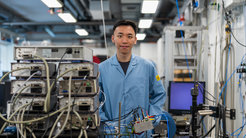Faces of the IMPRS: Guanmin Li
“My motivation for doing research is the sense of achievement when inventing something innovative and useful.”

What is the focus of your research/doctoral thesis?
My research focuses on novel devices and architectures for oscillator-based computational networks. It aims to decode how neurons communicate with each other and form memory in the brain, and to replicate these mechanisms using neuromorphic devices to enable more energy-efficient computing architectures.
What do you find most exciting about your research topic?
The most exciting aspect of this research project is its biological plausibility—an effort to approach the fascinating yet still not fully understood working principles of the human brain. Why do neurons exhibit different rhythmic activities? How do they communicate through synchronization? By selecting suitable materials that can be fabricated into functional devices, I am able to replicate these behaviors of biological neurons by tunable thermally coupled VO2 oscillators. This not only deepens our understanding of brain function but also offers an innovative path toward the development of neuromorphic technology.
In what ways does the IMPRS support you during your PhD?
Through regular report and feedback for PhD progress or problems. Scientific talks and retreat help promote communication. Workshops help with complementary skills.
Can you share an unexpected challenge you encountered and how you overcame it?
During the experiments, the test devices did not behave as expected. I had to identify possible causes of failure related to film growth, device design, and fabrication. Using a controlled variable approach, I systematically ruled out each potential issue one by one.
How do you stay motivated and focused throughout the PhD process?
I plan my experiments and vacations strategically, ensuring that I can take a break and recharge whenever I feel overloaded or frustrated with work. In addition, I regularly seek advice from more experienced colleagues to learn from their insights and approach tasks more wisely and efficiently.
What advice would you give to future PhD students?
Choose a field that truly interests you, read research papers to gain a broad understanding, develop your own ideas, and test them through experiments. Build on new findings and improvise as needed, gradually shaping your own scientific story. And remember—all work and no play makes Jack a dull boy—so make time to relax and enjoy the journey.
What are your plans or aspirations after completing your PhD?
I aim to transition into industry and apply my expertise to technologies that can help drive meaningful change and make the world a better place.
